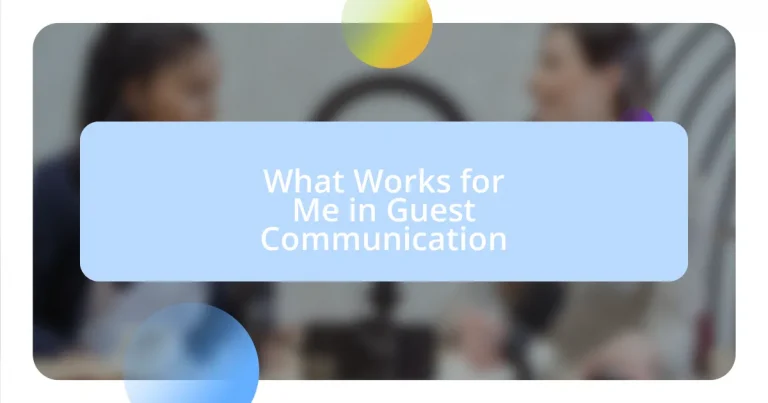Key takeaways:
- Effective guest communication involves personalization, clarity, and active listening to foster emotional connections and lasting relationships.
- Building rapport through small gestures, humor, and genuine presence can significantly enhance guest satisfaction and trust.
- Utilizing technology such as instant messaging and social media facilitates real-time engagement and prompt resolutions for guests’ concerns.
- Post-visit communication strategies, like personalized thank-you messages and feedback solicitation, reinforce guest loyalty and involvement in service improvement.
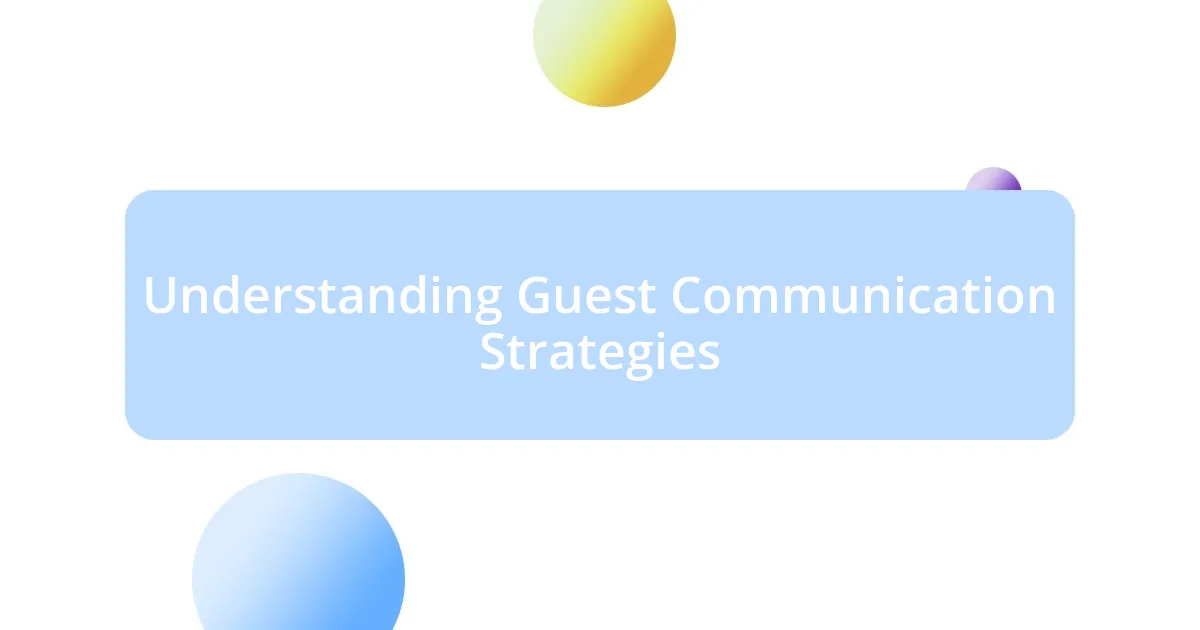
Understanding Guest Communication Strategies
Understanding guest communication strategies involves recognizing and valuing the diverse needs of each individual. I remember a time when a guest expressed frustration over late check-in. By simply listening and offering empathy, I turned a negative experience into a positive one. It made me realize that communication is not just about words; it’s about connecting emotionally with our guests.
When crafting my responses, I often wonder what makes guests feel most comfortable. Personalization plays a huge role; addressing someone by name or referencing their specific requests can make a world of difference. I once tailored a welcome message for a family staying for a reunion. The gratitude they expressed made me understand how thoughtful communication fosters lasting relationships.
It’s also essential to use clarity in our dialogue—confusion can lead to dissatisfaction. I always aim to explain policies or procedures upfront to prevent any misunderstandings. Have you ever found yourself lost in a jumble of instructions? I have, and I know how that feels. By prioritizing clear and concise communication, I aim to create an environment where guests feel informed and at ease.

Building Rapport with Guests
Building rapport with guests is all about making genuine connections. I recall a time when I made a small effort to remember a guest’s favorite beverage. When they returned for their next stay, I had it waiting for them. Their delighted reaction reminded me that simple gestures can create lasting bonds. It’s these little things that show guests they are valued and appreciated.
Moreover, humor can be a powerful tool in building rapport. One evening, I shared a light-hearted joke during check-in, which broke the ice and led to a delightful conversation. I find that laughter can ease tension and create a warm atmosphere. It reminds me of the saying, “People may forget what you said, but they will never forget how you made them feel.”
I’ve also learned that being present in the moment is crucial. When a guest approaches me with a concern, I focus intently on what they’re saying, maintaining eye contact and nodding to show I’m engaged. There’s something reassuring about knowing someone is genuinely listening. It creates trust and makes the guest feel seen, which is ultimately what building rapport is all about.
| Building Rapport Strategies | Examples from My Experience |
|---|---|
| Personalization | Remembering guests’ names and preferences, like their favorite drink. |
| Humor | Using light-hearted jokes to break the ice during check-in. |
| Active Listening | Maintaining eye contact and showing engagement when guests express concerns. |
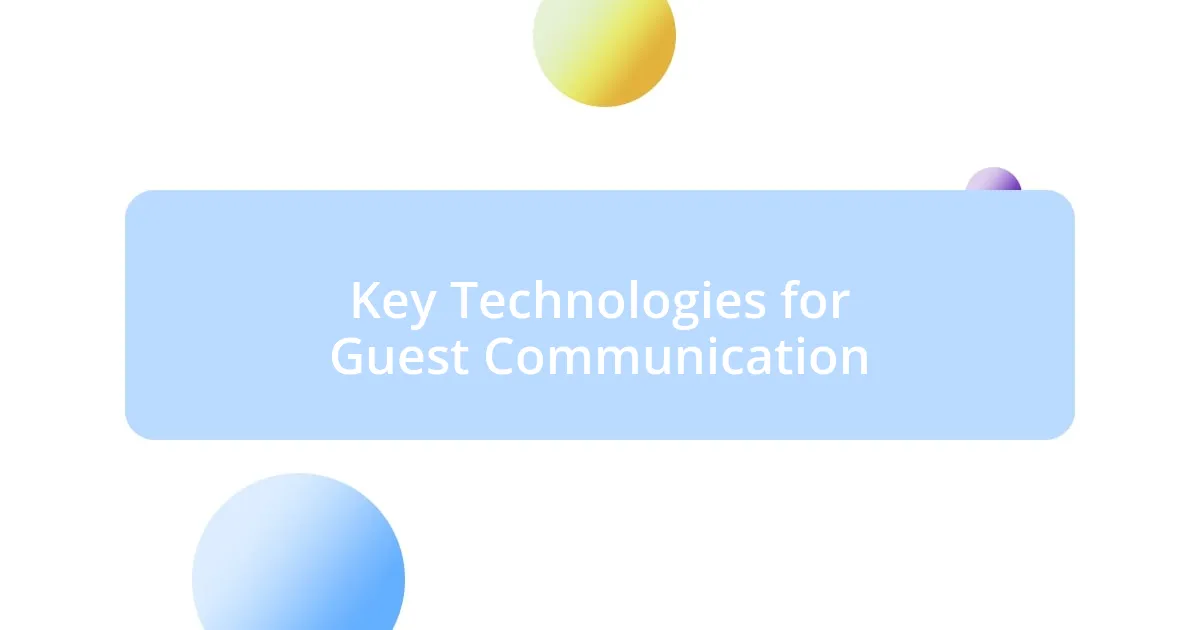
Key Technologies for Guest Communication
Key Technologies for Guest Communication
Adopting effective technologies for guest communication can truly enhance the guest experience. In my experience, using platforms that facilitate instant messaging has made a significant difference. I remember implementing a chat feature on our website, which allowed guests to ask questions in real-time. The positive feedback was overwhelmingly gratifying, as it not only made guests feel heard but also provided them with quick resolutions to their concerns.
Harnessing social media is another compelling tool. I recall how a simple post on our hotel’s Facebook page led to an unexpected conversation with a guest who had a unique dietary request. By responding promptly in a friendly manner, we ended up discussing local dining options, which ultimately made their stay much more enjoyable.
- **Instant Messaging Platforms:** Utilizing tools like WhatsApp or dedicated hotel chat apps for real-time communication.
- **Social Media Engagement:** Actively engaging with guests on platforms like Facebook or Instagram to foster community and dialogue.
- **Email Automation:** Implementing personalized automated emails for booking confirmations and follow-ups, ensuring guests feel informed.

Crafting Effective Messages
Crafting messages that resonate with guests is an art I’ve come to appreciate deeply. One evening, after an especially hectic day, I poured my heart into a thank-you email for a guest who had left us a glowing review. I reflected on their words, personalized my response, and expressed genuine gratitude. The guest replied, saying my message made their day and encouraged them to book another stay. Moments like this remind me how thoughtful communication transforms a simple message into a memorable experience.
It’s essential to consider the tone and clarity of your messages. In my experience, a friendly, approachable tone often yields the best response. I once sent a service update to guests ahead of a scheduled maintenance period; instead of using formal jargon, I opted for casual language that conveyed understanding and appreciation for their patience. The feedback was overwhelmingly positive. Guests valued the transparency and felt more at ease about their upcoming stay.
I also believe timing plays a crucial role in crafting effective messages. After noticing that guests sometimes feel overwhelmed by pre-arrival information, I adjusted my communication strategy by sending a concise welcome message just a day before their arrival. I’ve seen this approach ease their anxieties and create excitement, highlighting their upcoming trip. Have you ever thought about how a simple change in timing could dramatically shift the guest’s emotional journey?

Handling Guest Feedback Effectively
Handling guest feedback is truly a balancing act that requires both sensitivity and proactivity. I once received a comment from a guest who felt that our Wi-Fi was slow. Instead of brushing it off, I reached out to them directly to discuss the issue. This not only made them feel valued but also helped me understand that the problem extended beyond what I initially thought. By addressing it quickly, I turned a potential negative into an opportunity for improvement.
In my experience, it’s crucial to actively listen to feedback rather than just acknowledge it. I remember a guest sharing their frustrations about a noisy air conditioning unit. Instead of just apologizing, I invited them to share more about their experience over a quick call. This conversation uncovered that they had a specific preference for quieter models. By taking their feedback seriously and promising to look into it, I demonstrated that their comfort truly mattered to us, and they left feeling heard, not just another room number.
Moreover, follow-up is an often-overlooked aspect of handling feedback. After resolving issues, I always make it a point to reconnect with those guests. Once, after fixing a minor issue for a returning guest, I sent a quick message to check in on their satisfaction. They expressed surprise and delight, and it solidified their loyalty to our establishment. Have you considered how following up might further enhance your guest relationships? Ultimately, it shows that their opinions have a lasting impact and fosters a deeper connection.
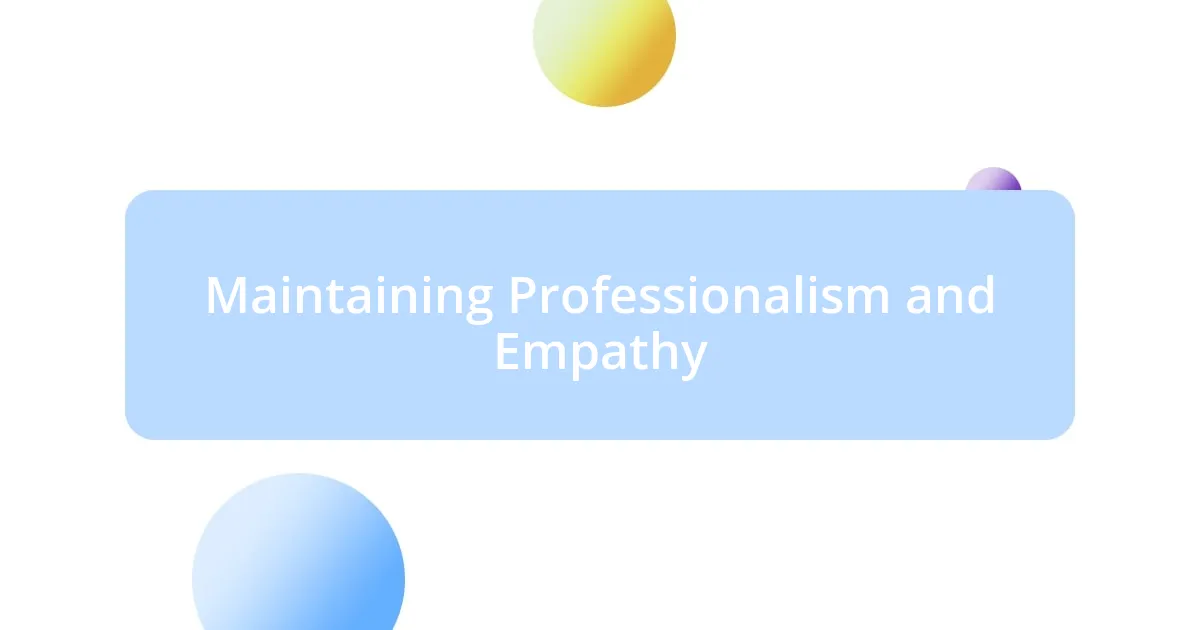
Maintaining Professionalism and Empathy
Maintaining professionalism in guest communication doesn’t mean sacrificing empathy; instead, I see them as two sides of the same coin. For instance, I once had a guest express concerns about their room’s location, feeling it was too noisy. Rather than simply assuring them I’d address their concern, I took a moment to empathize with their situation, acknowledging how important a peaceful environment is for relaxation. This small act of understanding transformed a standard communication into an exchange where the guest felt valued and respected.
Empathy is about connecting on a human level. I remember assisting a guest who was celebrating a milestone birthday. They were anxious about making the occasion special due to logistical issues. Instead of just providing the standard options, I listened and suggested a personalized touch, like a surprise cake delivered to their room. The joy in their voice when I followed up about their celebration showed me that my willingness to go the extra mile had a profound impact. Have you ever considered how that little extra care can turn a simple interaction into an unforgettable experience?
Professionalism requires striking a balance in tone, and I learned that clarity and warmth go hand in hand. There was a time I had to deliver news about a sudden change in check-in times due to unforeseen circumstances. I opted to explain the situation in detail while maintaining a friendly tone. The responses I received were overwhelmingly appreciative; guests felt informed rather than inconvenienced, proving that professionalism coupled with empathy can effectively manage expectations. Isn’t it amazing how genuine communication can foster trust?
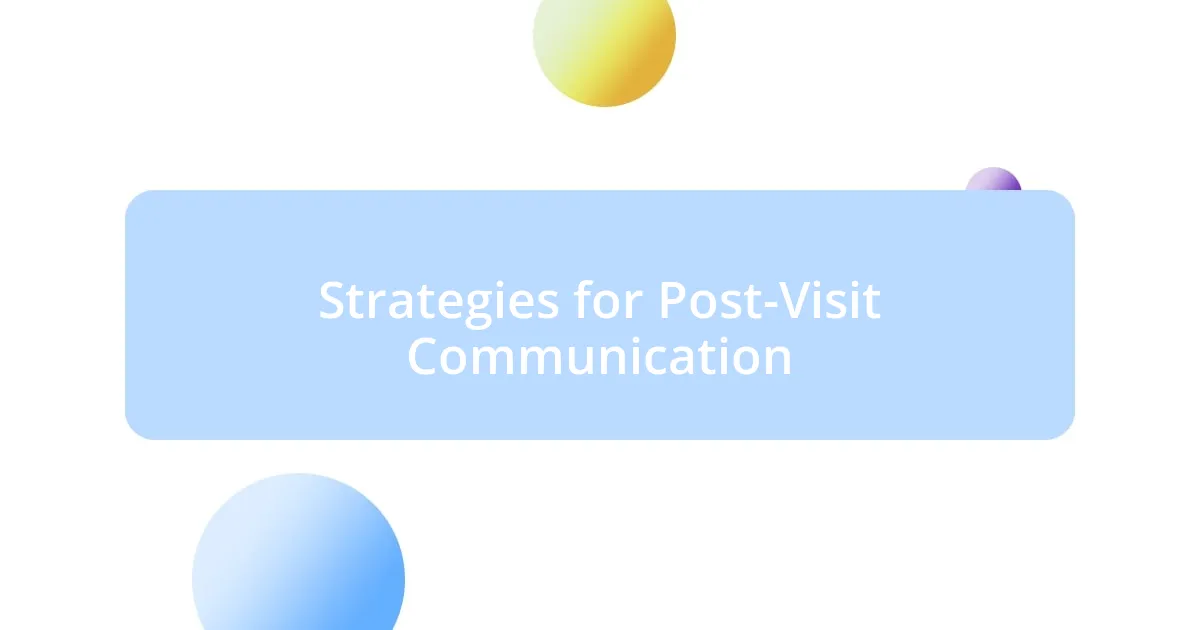
Strategies for Post-Visit Communication
One strategy that has worked wonders for me in post-visit communication is sending personalized thank-you messages. I remember one guest who left a lovely review after their stay, and I took a moment to drop them an email expressing my gratitude. Not only did this make them feel appreciated, but they also responded with even more encouragement and potential future visits in the pipeline. Isn’t it amazing how such a simple gesture can ignite guest loyalty?
Another effective approach is to solicit feedback directly after their stay has concluded. After a particularly busy weekend, I sent out personalized surveys to guests, asking for their thoughts on our services. Surprisingly, one guest shared insights that prompted us to revamp our breakfast offerings. Their feedback not only helped us fine-tune our menu but also made them feel involved in our continuous improvement process. Have you ever considered how your guests could contribute ideas just by asking them for their opinions?
Lastly, I find that sharing updates or changes based on guest feedback creates a sense of community. I once updated a blog post to highlight adjustments made after receiving suggestions on our amenities. Those guests who contributed felt a sense of ownership, and many reached out to say they appreciated our initiative. When guests see tangible results from their input, it reaffirms their trust in us. How often do you keep your guests in the loop about changes influenced by their insights?












